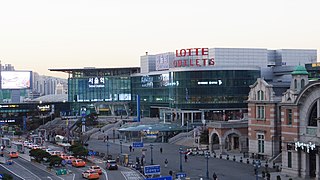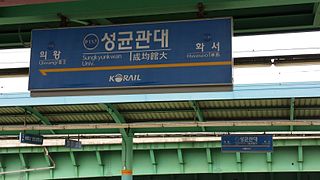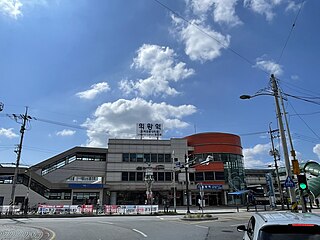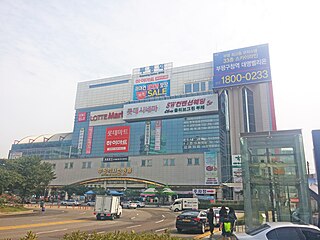Transportation in South Korea is provided by extensive networks of railways, highways, bus routes, ferry services and air routes that traverse the country. South Korea is the third country in the world to operate a maglev train, which is an automatically run people mover at Incheon International Airport.

The Gyeongbu line (Gyeongbuseon) is a railway line in South Korea and is considered to be the most important and one of the oldest in the country. It was constructed in 1905, connecting Seoul with Busan via Suwon, Daejeon, and Daegu. It is by far the most heavily travelled rail line in South Korea.

The Gyeongin Line (Gyeonginseon) is a railway mainline in South Korea, currently connecting Guro station in Seoul and Incheon. Commuter services along the line through operates into Seoul Subway Line 1.

The Suin Line was a metro line of the Seoul Metropolitan Subway serving the Seoul Capital Area.

Seoul Station (Korean: 서울역) is a major railway station in Seoul, the capital of South Korea. The station is served by the Korail Intercity Lines and the commuter trains of the Seoul Metropolitan Subway.

Seoul Subway Line 1 of the Seoul Metropolitan Subway is a rapid transit and commuter rail line which links central Seoul, South Korea to Yeoncheon in the northeast, Incheon in the southwest, and Sinchang via Suwon and Cheonan in the south. The central underground portion of Line 1, running underneath Sejongno, Jongno, and Wangsan-ro avenues along Seoul's traditional downtown area, is the oldest subway-operated section in the Seoul Metropolitan Subway system. Its branches and services cover a large part of the Seoul Capital Area; totaling 200.60 km (124.65 mi) in route length.

Yeongdeungpo District is an administrative district in southwest Seoul, South Korea. Although the origin of the name is uncertain, the first two syllables are thought to be from "yeongdeung" (靈登) or "divine ascent", a shamanic rite. The third syllable is "po", representing the bank of a river (浦), referring to the district's position on the Han River. The 2006 population was 408,819.

The Mugunghwa-ho (Korean: 무궁화호) is a class of train operated by Korail, main railway operator of South Korea. Mugunghwa trains are Korail's slowest tier of trains stopping at a number of towns and villages, and operating over a number of lines that are not served by other trains. Journey times are generally twice that of KTX trains and 25% longer than ITX express trains.

Sindorim station is a station on Seoul Subway Line 1 and Line 2 (underground). It is also the southeastern terminus of Line 2's Sinjeong Branch to Kkachisan. The station is located at the northern edge of Sindorim-dong, Guro-gu, Seoul, on the border with Yeongdeungpo-gu.

Suwon Station is a railway station in the city of Suwon, South Korea. The station was completely redeveloped in 2002 and 2003, and is now integrated with the Aekyung Shopping Mall. This station serves Inter-city railway Gyeongbu Line KTX, ITX-Saemaeul and Mugunghwa will stop. Also Line 1, Suin–Bundang Line of the Seoul subway will stop. And this station is an important hub in southern Gyeonggi Province.

Cheongnyangni Station (청량리역) is a major railway station located at Dongdaemun-gu, Seoul, South Korea. It serves as a terminus for passenger trains serving the eastern part of South Korea. KTX, ITX-Cheongchun, and Mugunghwa-ho trains terminates or stops at this station. Several Seoul Metropolitan Subway lines serve the station. These are: Seoul Subway Line 1, the Gyeongchun Line, the Suin–Bundang Line and the Gyeongui–Jungang Line.
Seoul, the capital and largest city in South Korea, accounts for only 0.6% of the country's total land area, yet it is home to around 19% of the population. The population density in Seoul demands a great deal of the city's transportation systems, which are regarded by many as among the best and most advanced in the world. Seoul is very well connected by its subway and bus systems, and the city is also very supportive of pedestrian foot travel. In 2006 it won the Sustainable Transport Award.

Guro Station (Korean: 구로역) is a subway station in Guro District in Seoul, South Korea. It serves Seoul Subway Line 1.

Sungkyunkwan University Station is a ground-level metro station on line 1 of the Seoul Subway in Yuljeon Dong, Jangan Gu, Suwon, South Korea. The station is nearby Sungkyunkwan University and Dongnam Health College. Travel time from Sungkyunkwan University Station to Seoul Station on Line 1 is 54 minutes, and travelling to Sungkyunkwan University's other campus, by Hyehwa Station in Seoul, takes 67 minutes, transferring to Line 4 at Geumjeong. The original station building was demolished, and a new, larger building incorporating shops, clinics, and a car park, was built, opening in late 2016.

Uiwang Station is a ground-level metro station on line 1 of the Seoul Subway in Uiwang, South Korea. The station's four exits offer access to the Korea National University of Transportation, the Korean Railroad Museum and the Bugok Dong area of Uiwang. Travel time from Uiwang Station to Seoul Station on Line 1 is 50 minutes.

Gwangmyeong station (Korean: 광명역) is a train station in Gwangmyeong, South Korea. The station was newly built as a stop of national railway operator Korail's KTX high-speed service, 22.0 km (13.7 mi) south of Seoul Station.

Geumcheon-gu Office Station, formerly known as Siheung Station, is a station on the Line 1 of the Seoul Subway, as well as the Gyeongbu Line. Commuter rail trains on Line 1 travel southwards from here to Anyang, Suwon, Pyeongtaek and Cheonan Stations via the Gyeongbu Line.

Bupyeong station is a subway station located in Bupyeong District, a district in Incheon, South Korea. This station is on the Seoul Subway Line 1 and Incheon Subway Line 1. It is one of the busiest stations on the Incheon line because of its central location and its connection to the Seoul line.

Anyang Station is a ground-level subway station on Line 1 of the Seoul Metropolitan Subway. The station is located in the Anyang One neighborhood, in Manan District, Seoul. The station's sole exit offers access to Enter-6 Mall, which occupies the same building. Travel time from Anyang Station to Seoul Station on Line 1 is approximately 40 minutes. Anyang Station is the main station in Anyang, but there are another six stations in Anyang, namely Beomgye, Pyeongchon and Indeogwon on Line 4, and Myeonghak, Gwanak and Seoksu on Line 1, though the latter's platforms lie within Seoul. It is connected with Lotte Dapartment Store.

Seojeongni Station is a station in Seojeong-dong, Pyeongtaek, South Korea. Mugunghwa-ho trains running on the Gyeongbu Line stop here. Additionally, services on Seoul Subway Line 1 have been calling at this station since 2005. Its station subname is Kookje College.



















